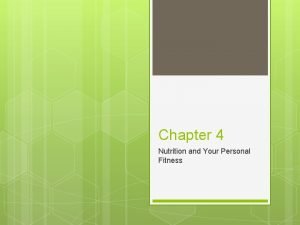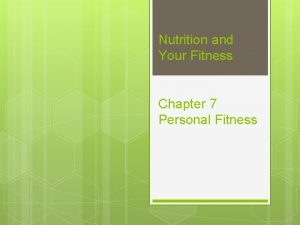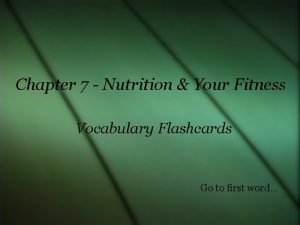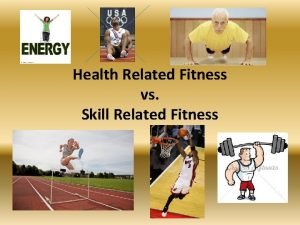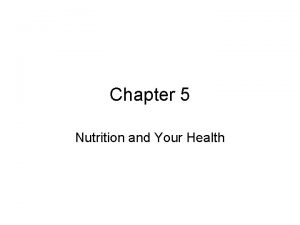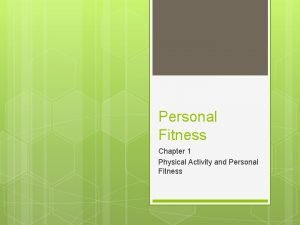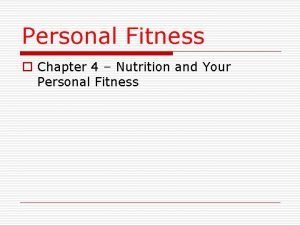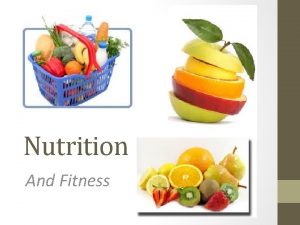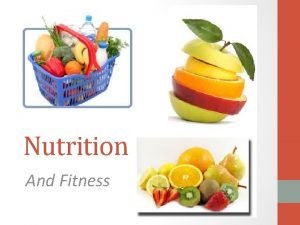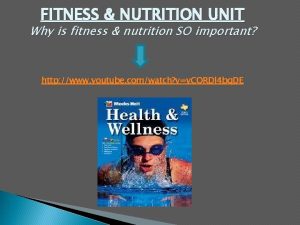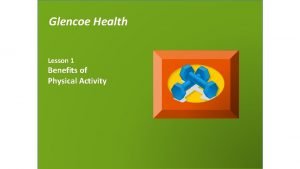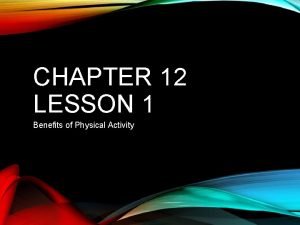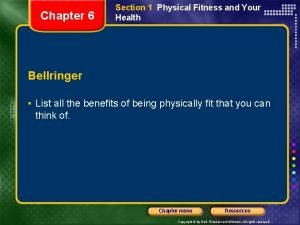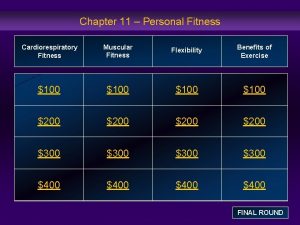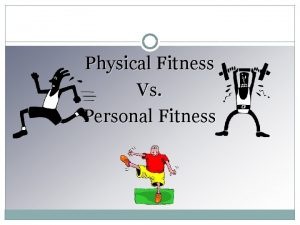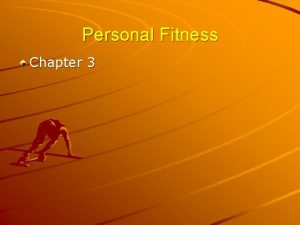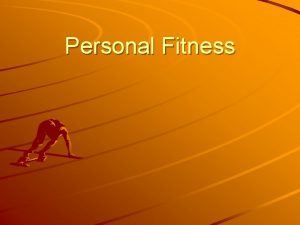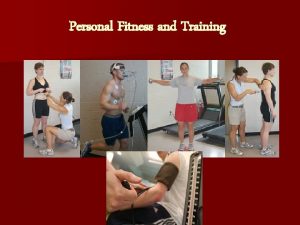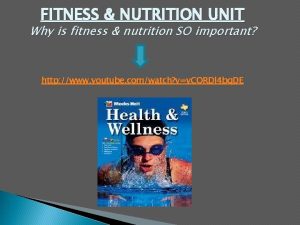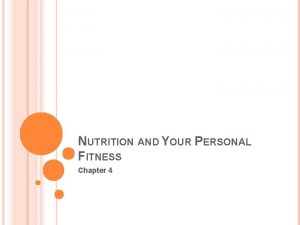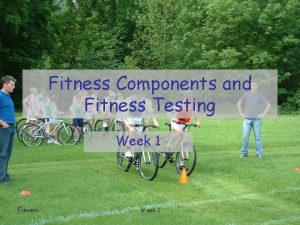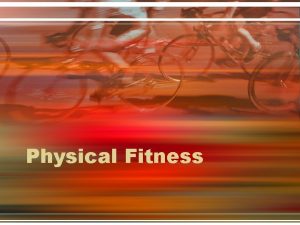Chapter 4 Nutrition and Your Personal Fitness The
















- Slides: 16

Chapter 4 Nutrition and Your Personal Fitness

The Importance of Nutrition Lesson 1 Healthful eating Nutrients are substance in food that your body needs for energy, proper growth, body maintenance, and functioning. Influences and Your food Choices Hunger Culture Family & friends Emotions Convenience and cost advertising

What is the difference between hunger & appetite? Hunger is natural, inborn drive that protects from starvation. Appetite is a personal desire, rather than a need. It is psychological, not physical.

Nutrients for Energy Carbohydrates Bodies Proteins – 4 calories per gram main source of energy – 4 calories per gram Build, maintain, and repair body tissues (muscle) Fats – 9 calories per gram Most concentrated form of energy and helps transport other nutrients (fat soluble vitamins)(A, D, E, K)

Carbohydrates 4 calories per gram Simple carbohydrates (simple sugars) Breaks down very quickly Fruits, candy, cookies, soda Complex carbohydrates Broken down more slowly Starches Certain vegetables (corn, broccoli, potatoes) Breads, cereals, pasta, rice, dry beans *dietary fiber-aids in digestion & reduces the risk of colon cancer. 36 grams – Females & 38 grams Males

Protein 4 calories per gram Muscles are made up of 20% protein & 70% water. Helps build & repair muscles Helps fight disease Provides some energy Amino acids – building blocks of proteins 22 different types Body manufactures all but 9 9 are called essential nutrients, because you must get them from foods you eat. Most people need between 10% - 35% of daily calories

Complete & Incomplete Proteins Compete Proteins Contain all 9 essential amino acids Examples: Incomplete animal products – meats & dairy Proteins Except soybeans, all plant foods Vegetarians Eliminate meat, fish and poultry from diet Vegans Same as vegetarians, but also eliminate eggs and dairy

Fats 9 calories per gram Twice the energy of carbs & proteins Transport and absorbs vitamins A, D, E, K Regulates testosterone Enhances flavor of food Satisfies hunger – longer to digest

Types of fat Saturated fatty acids Trans fatty acids Mainly from animal fats Butter, lard Solid at room temperature Formed when certain oils are processed into solids Margarine & shortening Listed on labels as “partially hydrogenated” Unsaturated fatty acids Liquid at room temperature Mainly from plant sources Examples: corn oil, soybean oil, olive oil, sunflower oil, fish oil

Cholesterol Low density lipoprotein (LDL) usually from your diet “bad” Compound that carries cholesterol from liver Excess can build in the arteries Increases the risk of heart disease or stroke High density lipoprotein (HDL) made in your body Compound to the liver “good” that picks up excess cholesterol & takes it

Vitamins, Minerals, and Water Lesson 2 Micronutrients – nutrients needed in small amounts vitamins minerals

Vitamins control body processes & help body release energy Fat-soluble carried by fat in your body Can be stored Water-soluble Not stored in your body, need to be replaced daily

Antioxidants- vitamins C & E protect body cells from damage Cells damaged from: Cell energy production Environmental factors: Smoking Air pollution Protect cells from injury, reduce the risk of: Cancer, heart disease, premature aging

Minerals body cannot manufacture, but needed for healthy bones, teeth and regulating body processes. Iron Part of the hemoglobin in red blood cells Carries oxygen from the lungs to all the cells Calcium, Potassium & Sodium Electrolytes maintain normal heart rhythm Control body’s fluid balance

Water Important because: Regulates body temperature Carries nutrients Aids in digestion & elimination Helps with chemical reactions in body Body needs 64 ounces (8 cups) a day Body is between 60 -70 percent water Essential for life – without it, death will occur in 6 -7 days

Phytonutrients “Plant Nutrients” Health promoting substances found in plant foods Lutein – protects against blindness Yellow-orange fruits (mangoes, peaches, tangerines, yellow & red bell peppers) Kale, spinach, collard greens Beta carotene orange foods (carrots, cantaloupe, sweet potatoes)
 Chapter 4 nutrition and your personal fitness
Chapter 4 nutrition and your personal fitness Kelsey carbonetta
Kelsey carbonetta Fitness chapter 7
Fitness chapter 7 Seven nutrition and fitness
Seven nutrition and fitness Health-related skill
Health-related skill A saturated fatty acid holds all the hydrogen atoms it can.
A saturated fatty acid holds all the hydrogen atoms it can. Fitness chap 1
Fitness chap 1 Fitness & nutrition
Fitness & nutrition Nutrition sport
Nutrition sport Fitness & nutrition
Fitness & nutrition Fitness & nutrition
Fitness & nutrition Fitness & nutrition
Fitness & nutrition Fitness & nutrition
Fitness & nutrition Fitness & nutrition
Fitness & nutrition Chapter 12 lesson 1 benefits of physical activity
Chapter 12 lesson 1 benefits of physical activity Glencoe health chapter 12
Glencoe health chapter 12 Fitness chapter 6
Fitness chapter 6
